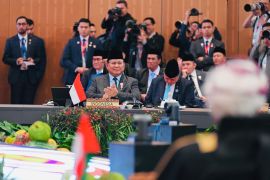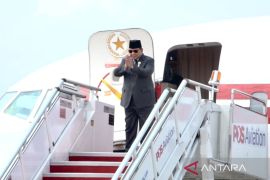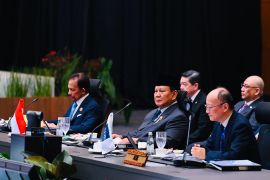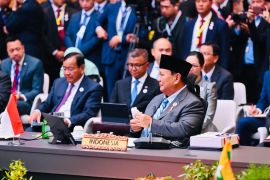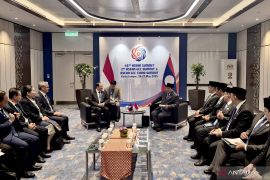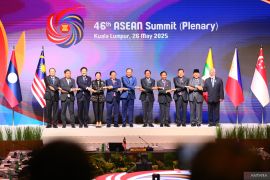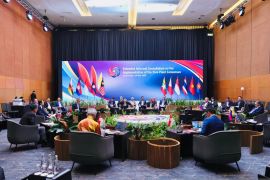The ASEAN leaders` remark was contained in the Chair`s Statement of the ASEAN Summit taking place at the Jakarta Convention Center on Sunday evening.
The ASEAN leaders recalled ASEAN basic provisions on global visions and commitments, ASEAN Joint statements on various global issues, and ASEAN collaborations with various international and regional organizations, in underscoring the foundation and future direction for an outward looking ASEAN Community that could play a pivotal role in the international flora, and advance ASEAN`s common interest.
They agreed to develop an ASEAN common platform on global issues, and to enhance ASEAN`s capacity to respond to key global issues, that aims to promote greater coordination, coherence and cohesiveness on positions and efforts undertaken by ASEAN to address global challenges of the 21st century.
According to them, to help better prepare ASEAN for this undertaking, they also agreed that ASEAN should make a detailed and comprehensive study and assessment of the key medium to long-term global trends and expected transformations in the global architecture.
They decided to issue at the 19th ASEAN Summit a declaration on ASEAN Community in A Global Community of Nations to further promote a common platform on global issues.
The ASEAN leaders tasked their foreign ministers to work on such a declaration.
For that purpose they issued the ASEAN Leaders`Joint Statement on the ASEAN Community in a Global of Nations, stating their agreement to have a common platform on global issues to be optimally attained by 2022.
Peace and Reconciliation
Observing current geopolitical developments in the region and in the world, they pointed out the need for ASEAN to enhance its capacity to ensure greater peace, security and stability in the region, including on conflict management and resolution.
As a step towards that goal, they agreed to commence the process towards establishing an ASEAN Institute for Peace and Reconciliation, as stipulated in the APSC Blueprint. The institute may, inter alia, undertake relevant researches and studies, and provide counsel and recommendations to ASEAN governments on the promotion of peace and reconciliation.
They therefore agreed to task their foreign ministers to work on the modalities towards the establishment of the institute and submit their recommendations to the 19th ASEAN Summit in Bali for its consideration.
As a step towards that goal, they agreed to commence the process towards establishing an ASEAN Institute for Peace and Reconciliation, as stipulated in the APSC Blueprint. The institute may, inter alia, undertake relevant researches and studies, and provide counsel and recommendations to ASEAN governments on the promotion of peace and reconciliation.
They therefore agreed to task their foreign ministers to work on the modalities towards the establishment of the institute and submit their recommendations to the 19th ASEAN Summit in Bali for its consideration.
Trafficking in persons
The ASEAN leaders also expressed concern at the increasing cases of trafficking in persons and people smuggling in the region and tasked their ministers in charge of transnational crimes to accelerate the consideration of an ASEAN Convention on Trafficking in Persons.
They stressed that victims of trafficking, mainly vulnerable women and children, have a fundamental right to be protected in accordance with the international law and relevant international conventions.
The ASEAN leaders acknowledged with appreciation the work of the Bali Process on People Smuggling, Trafficking in Persons and Related Transnational Crime, which specified concrete actions to mitigate the problems of irregular movement of people, in particular people smuggling and trafficking in persons.
They agreed to enhance further cooperation within existing frameworks and instruments which are consistent with national laws and regulations.
They also recognized the need of greater regional coordination on anti-drug efforts given the cross-border and transnational nature of illegal drug activities.
In order to meet the vision of a Drug-Free ASEAN by 2015, they highlighted the need to fully and effectively implement the ASEAN Work Plan on Combating Illicit Drug Production, Trafficking, and Use for 2009-2015 through the conduct of specific programs and activities.
Encouraged by the progress in the implementation of the ASEAN Charter and Roadmap for an ASEAN Community, they provided guidance and reiterated their commitment to advance the ASEAN Community building process through concrete, practical and meaningful actions.(*)
B005/E002
The ASEAN leaders also expressed concern at the increasing cases of trafficking in persons and people smuggling in the region and tasked their ministers in charge of transnational crimes to accelerate the consideration of an ASEAN Convention on Trafficking in Persons.
They stressed that victims of trafficking, mainly vulnerable women and children, have a fundamental right to be protected in accordance with the international law and relevant international conventions.
The ASEAN leaders acknowledged with appreciation the work of the Bali Process on People Smuggling, Trafficking in Persons and Related Transnational Crime, which specified concrete actions to mitigate the problems of irregular movement of people, in particular people smuggling and trafficking in persons.
They agreed to enhance further cooperation within existing frameworks and instruments which are consistent with national laws and regulations.
They also recognized the need of greater regional coordination on anti-drug efforts given the cross-border and transnational nature of illegal drug activities.
In order to meet the vision of a Drug-Free ASEAN by 2015, they highlighted the need to fully and effectively implement the ASEAN Work Plan on Combating Illicit Drug Production, Trafficking, and Use for 2009-2015 through the conduct of specific programs and activities.
Encouraged by the progress in the implementation of the ASEAN Charter and Roadmap for an ASEAN Community, they provided guidance and reiterated their commitment to advance the ASEAN Community building process through concrete, practical and meaningful actions.(*)
B005/E002
Editor: Aditia Maruli Radja
Copyright © ANTARA 2011

